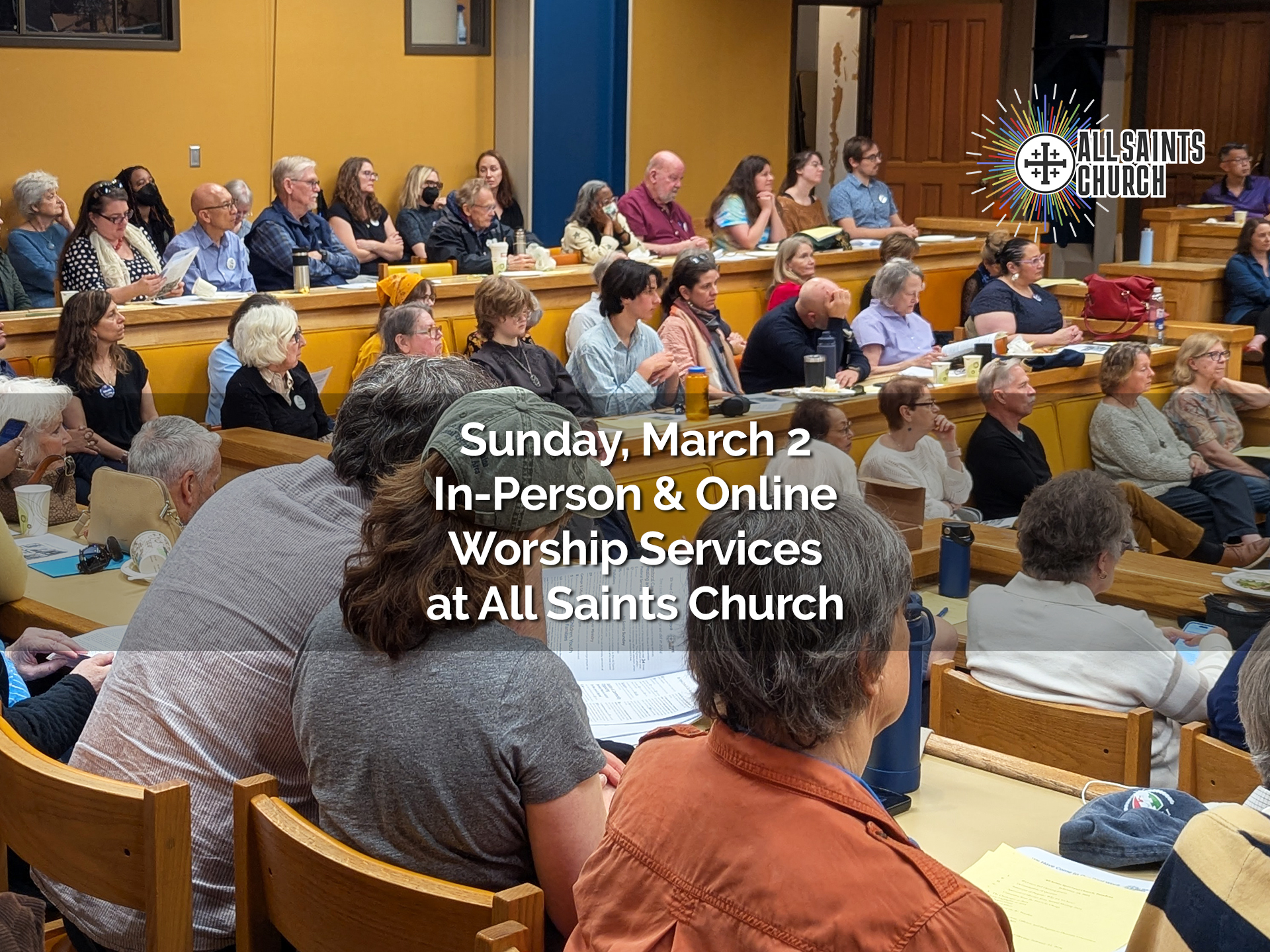“In the delusion of separateness, everything divides into opposition and binaries. Baptism is a sacrament that wakes us up to the reality that God is for everyone everywhere. We can no longer separate or exclude anybody or anything from grace. Especially under the guise of religion.”
Sermon by Sally Howard at All Saints Church, Pasadena, on Sunday, January 12, 2020. Readings: Isaiah 42:1-9 and Matthew 3:13-17.
Follow All Saints Church on Twitter @ASCpas. Like us on Facebook at https://www.facebook.com/AllSaintsPasadena/.
Donate to support the mission and ministries of All Saints at https://allsaints-pas.org/donate/donate-now/.
++++++++++
Our community gathered for the first vestry meeting of the year last Tuesday, on the eve of the news of escalating violence in the middle east in reaction to our country’s killing of Iranian General Qasem Soleimani.
Led by our rector Mike, we paused to pray, and to share what was on our hearts and minds—our common sadness, anguish at the loss of life, disbelief, feelings of complicity, powerlessness, and most of all, fear for the children and grandchildren of the world, fear of impending war.
Our junior warden, Steve Williams recalled this hymn,
On Christ the solid Rock I stand
All other ground is sinking sand
All other ground is sinking sand
When darkness seems to hide God’s face
I rest on Her unchanging grace
In every high and stormy gale
My anchor holds within the veil
There was a shared moment of peace. There was hope again, and faith that love is the most powerful force in the universe. By coming together as we did, as we do, we were able to establish an experience of relatedness, an experience of belovedness, and we were able to carry on the important work before us.
Today is the second Sunday of Epiphany. In scripture, this is a season of wisdom and the hidden Divine opening forth into the world. This year we surely need hope for our vision of a world of peace and justice, a world where no child is born to disaster and every person’s dignity is protected and honored. The story of Jesus’ baptism gives us the anchor we need to stand steady and strong in a world riddled by fracture and violence. It tells us what is deepest within us and helps us see what is deepest within everyone else.
Baptism in our tradition is a sacrament, a ritual that uses the most ordinary things of daily life-in this case, water and human hands-to reveal the inner reality of God’s presence with in us, and all of creation. We need sacraments because when the vastness of God meets the limits of our humanity, our words and thoughts can’t hold it.
Baptism reveals not only our primary identity, it is the central ordination of ministry. The other three orders of ministry–deacon, priest, and bishop exist to support the central order of baptism. Later in this service we are given the opportunity to renew our own baptismal vows. Rather than just accepting a baptism that has been chosen for us in many cases, we can consciously commit to our covenant and promise ourselves to the ministry of healing and reconciliation.
The ritual of baptism is derived from the common practice of Immersion in water in the ancient Jewish world. At the time of Jesus, the act of immersion in natural sourced water, like the Jordan River, was called a mikva. It was associated with purity or restoration for full participation in the community. However, the word mikveh actually shares the same root as the word for hope and alignment of one’s whole being with God. It conveys the concept of hoping or waiting in confidence for God’s goodness to prevail over powers of harm and destruction. The root word also conveys binding or twisting together, like yarn-like the yarn used in our prayer shawls. To participate in mikveh, was to bind together in hope that God is present and active even in the worst of circumstance and that God’s goodness will prevail. Some Jewish women today still find deep meaning in the ritual of the mikveh.
In Hebrew Scriptures, water has often been associated with the Spirit of God. In creation, the Spirit brooded over the waters, in the Exodus, She led Israel through the River Jordan and the wilderness to establish the people in safety and freedom. We don’t know what Jesus’s exact thoughts were about his own baptism, but we do know that Jesus was deeply rooted in the life of the Spirit through prayer and meditation. The Spirit drew him to the River Jordon.
At Jesus’ baptism, we witness Jesus’ dawning realization of who he is: the beloved child of God. Jesus has often been portrayed as if he was fully aware of who he was, with an identity already clear and fully formed from infancy. Remember all those paintings of Jesus as an infant making the sign of the cross in blessing? It’s as if Jesus skipped over all that messy human development stuff—teenage acne, the terrible twos…I don’t think so! Jesus was human! These are stages that we all go through to become who we are. Baptism from that viewpoint was confusing to me. You mean Jesus didn’t need to be baptized, but he did it to show us what we needed to do to be cleansed of sin? That perspective on baptism robs us of Jesus’ full humanity, and the deepest truth of baptism.
But today we hear the good news that in the River Jordan, Jesus received the guarantee that deepest within him was the Divine presence of God. He needed be anchored in his belovedness in order to be the healer, the disrupter of systems of exclusion and cruelty, and ultimately to walk towards his own death.
And we all face these same challenges. We are dependent throughout life on the experience of secure relatedness to be our fullest selves in the world. In order to love most fully we need connection to Love that never waivers, love that treasures us beyond all measure just because we exist.
When we are secure in our absolute belovedness to God, we are better able to accept, forgive, and celebrate the full story of our lives, in both brokenness and blessing. We don’t have to tell only the parts that align with who we think we are supposed to be, or what we think might make Aunt Mary happy.
Here’s another thing about the experience of secure attachment. When we are anchored in the experience of secure love, we are more able to seek unity and connection with others while tolerating difference and change. As we become more open to the epiphany of every human being, we are given the courage to give up power and privilege, to step aside from all that is false. It enhances our ability to carry out our baptismal covenant to seek and serve Christ in all persons, loving our neighbors as ourselves. That is, to strive for justice and peace with respect for the dignity of every human being. When we are anchored in love that not even death can sever, we can love, risk, and serve with gladness and singleness of heart.
This primary gift Jesus came to give us, is this experience of our belovedness, of our indissoluble union with God. It is even the foundational experience that creates all healthy “church” or spiritual family. When we lack such safety and wisdom, it is hard for us to move beyond ego, the deep desire for control and public posturing,
and that goes for churches, governments, and our leaders.
To paraphrase Elaine Pagels, “Terror is the nightmare we live in and create, if we believe we are separate.” In the delusion of separateness, everything divides into opposition and binaries.
Baptism is a sacrament that wakes us up to the reality that God is for everyone everywhere. We can not separate or exclude or anybody or anything from grace, especially under the guise of religion.
We all sometimes suffer from a tragic case of mistaking our own identity, aligning with something unworthy of our souls. At our low points, we are one step away from either enlightenment or despair.
When you have not learned what belovedness feels or looks like, someone—a loving human or simply God’s own embrace—needs to hold you, because you cannot hold yourself! The symbols of baptism are water, God’s spirit of outpouring love–and human hands.
We cannot baptize ourselves. Growth into our belovedness is a life long journey, and we can never do it alone. We come together to remind each other of who we are and the circle of love to which every person belongs. The experience of this radical holding, and deep loving, is the salve—the salvation of God. We are at home here and now, everywhere and forever.
As we baptize three beautiful children today, we recognize the one-of-a-kind epiphany of God each one of them is. We promise to protect and nourish their belovedness as they grow into the fullness of being. May these baptisms today be an experience of secure attachment for our precious children, an experience of relatedness for our community, and an experience of belovedness we offer to all children of the world.
Amen



